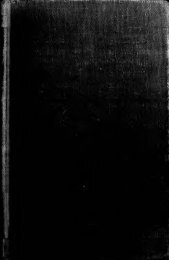Ecclesiastes - GA Barton - 1908.pdf
Ecclesiastes - GA Barton - 1908.pdf
Ecclesiastes - GA Barton - 1908.pdf
You also want an ePaper? Increase the reach of your titles
YUMPU automatically turns print PDFs into web optimized ePapers that Google loves.
144<br />
ECCLESIASTES<br />
The world often hates its greatest men and makes marks of them.<br />
In one sense it is not good to be ahead of one's time. 17. Be not<br />
excessively wicked}. Some interpreters, as Del., hesitate to admit<br />
that Qoheleth really implies that one may sin to a moderate degree.<br />
That, however, is what he undoubtedly implies. It is true that<br />
he was led into this statement by the necessity of an antithesis,<br />
but there is no reason to believe that the thought was repugnant<br />
to him. Nor be a fool]. Righteousness and wisdom are to Qo-<br />
heleth kindred terms, while wickedness and folly form a counter-<br />
balancing couplet. Why shouldst thou die before thy time?}. In<br />
spite of the fact that Qoheleth had seen many men prolong their<br />
lives in their wickedness (vs. 15), he recognizes that debauchery<br />
ends in premature death. 18 a . This . . . thai refer to " righteous-<br />
ness" and ''wickedness" of the two preceding verses. Qoheleth<br />
here sums up his thought, advising<br />
the avoidance of extremes in<br />
either righteousness or wickedness. Cf. Horace, Virtus est<br />
medium viatorum et utrimque reductum (Epist. I, 18, 9), and<br />
Ovid, Medio tutissimus ibis (Met. II, 137).<br />
18 b . For he thatf&rs God shall be quit in regard to both}. This is<br />
a gloss added by some orthodox Jew, probably a Chasid. 19. Wisdom<br />
strengthens the wise]. It is impossible to find any intelligent<br />
connection for this verse with the preceding context. It is un-<br />
doubtedly an interpolation by the glossator who was interested<br />
in proverbs (so Gr., Sieg., McN. and Ha.). Ten rulers]. Gins.,<br />
Ty. and Plumtre took " ten" as a round number, Delitzsch thought<br />
it referred to some definite situation, such as the archons at Athens.<br />
Wright, with more probability, compares the Mishna (Megilla,<br />
i 3<br />
),<br />
which says that " every city is great in which there are ten men of<br />
leisure." The idea here is similar, 'only the "men of leisure" are<br />
represented as "rulers."<br />
20. For there is not a righteous man in the earth}.<br />
This connects<br />
with vs. i8a, from which it is now separated by two interpolations,<br />
and gives the reason for it. It is a quotation from i K. 8 46 . There<br />
is -no good reason for regarding the vs. as a gloss, as Siegfried and<br />
Haupt do. 21. The words which they speak}. "They" is indefinite,<br />
referring to men in general. The way in which men talk about<br />
one another is further proof that all sin. Lest thou hear thy servant





